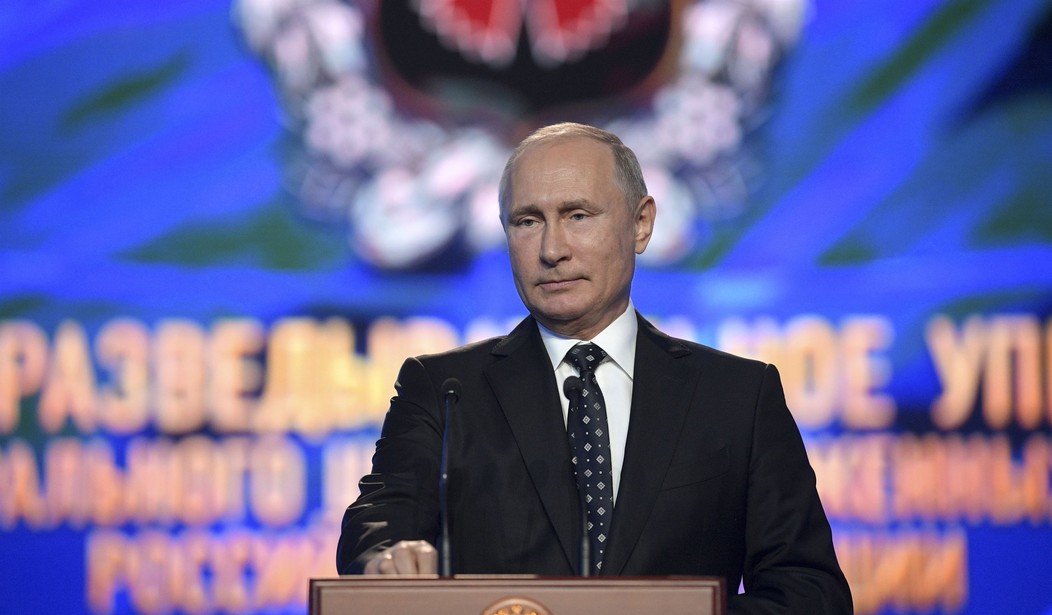Did Vladimir Putin get what he wanted with his massive military build-up on the border with Ukraine? Troops began pulling back overnight as the Russian government announced an end to the “exercise,” but they will take their time in pulling back to their bases. They’ll be back later this year, too — one way or another.
And in some ways, we’re guaranteeing it:
Russian troops began pulling back to their permanent bases Friday after a massive buildup that caused Ukrainian and Western concerns.
On Thursday, Russian Defense Minister Sergei Shoigu declared the sweeping maneuvers in Crimea and wide swaths of western Russia over, and ordered the military to pull the troops that took part in them back to their permanent bases by May 1.
At the same time, he ordered their heavy weapons kept in western Russia for another massive military exercise called Zapad (West) 2021 later this year. The weapons were to be stored at the Pogonovo firing range in the southwestern Voronezh region, 160 kilometers (100 miles) east of the border with Ukraine.
The pullback surprised some, as violations of the cease-fire in eastern Ukraine had increased. The impression was that Putin had wanted to use those as a pretext to roll troops into Ukraine and touch off a war. The government in Kyiv tried to play it cool, asking for Western diplomatic support to force Putin out. Instead, Putin played out the string and left on his own, but while making it patently clear that the West had very few options in Ukraine or anywhere around the Russian frontier.
In the middle of this crisis, Joe Biden decided to agree to a summit with Putin in Moscow, offering Putin a diplomatic win. Did that summit offer play into this retreat? Not at all, the Kremlin told reporters:
Asked if the Kremlin thinks that the Russian troop pullback could help ease tensions with the United States, Russian President Vladimir Putin’s spokesman, Dmitry Peskov, said that the issues aren’t connected.
“It’s not an issue for Russia-U.S. relations,” Peskov said in a call with reporters. “We have said that any movement of Russian troops on Russian territory doesn’t pose any threat and doesn’t represent an escalation. Russia does what it thinks is necessary for its military organization and training of troops.”
If Putin wanted to send a message, it got through, analysts tell NBC News:
“This is a partial withdrawal, and an end to the buildup in Crimea. However, it remains to be seen how much hardware they leave behind,” said Michael Kofman, a senior research scientist at CNA, a research group based in Virginia.
“I think Moscow believes that its message was delivered, and this coercive demonstration served its purpose,” he added. …
“The immediate crisis is over for now,” said Vladimir Frolov, a Moscow-based political analyst. But he also said he felt that Russian President Vladimir Putin may have accomplished what he set out to achieve with the buildup — namely that the conflict “could only be settled on Russia’s terms, or else.”
If that was Putin’s point, he made it. Adding a warning in his address yesterday warning other nations not to cross Moscow’s “red lines” was an exercise in gilding the lily, but the same can be said of the latest military demonstration as well. Putin made that same point excruciatingly clear in his military seizure of Crimea in 2014, and the rest of his war in eastern Ukraine under the cover of ethnic-Russian “separatists.” The West responded with diplomatic and economic sanctions, but not militarily, and this exercise reminded everyone that NATO doesn’t have the will or desire to go to war with Putin to make Crimea Ukrainian again.
That hasn’t changed in the past seven years, and Biden isn’t the president to lead NATO into a war with Russia. Nor, it should be said, should Biden start a war with Putin over it. Sanctions and tough negotiations are the proper way to deal with Putin on this issue, but even those will be a stretch, especially with Biden making policy choices that will enrich Putin all over again by driving up energy prices.
For all the talk about Donald Trump being soft on Russia and Putin (true personally on the latter but not in business terms), Trump understood the geopolitical leverage that US energy production created. The severe drop in energy prices crippled Putin and Iran for that matter, adding a lot of bite to the economic sanctions that expanded under Trump on both countries. Without an ability to build wealth through the sale of their only valuable export, both countries had limits on their adventuresome policies in their regions.
In contrast, Biden’s giving away that leverage by restraining exploration and production at home in exchange for unenforceable pledges from China, India, and other mass-polluting economies. That might make Biden’s climate-change activist allies happy, but it’s going to delight Putin and Ali Khamenei in the long run. Biden’s not just giving them both carte blanche in their regions (which both had anyway), he’s providing them the funding for whatever they want to accomplish.
Ukraine’s officially breathing a sigh of relief as Putin’s troops withdraw. Unofficially, I’d bet that they realize that Ukraine will be destined to remain under Putin’s thumb as he rebuilds the imperial vision of Russia that Putin has always desired.








